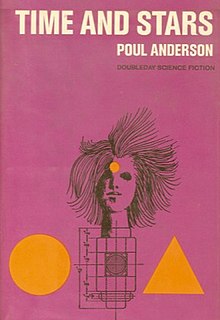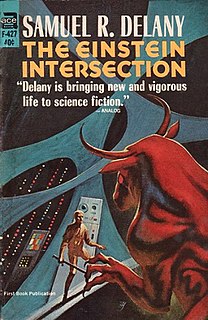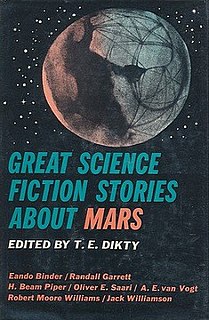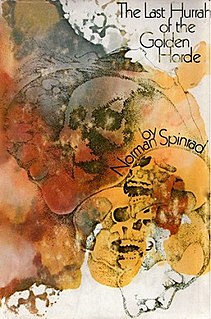Related Research Articles
The New Wave was a movement in science fiction produced in the 1960s and 1970s and characterized by a high degree of experimentation in both form and content, a "literary" or artistic sensibility, and a focus on "soft" as opposed to hard science. New Wave writers often saw themselves as part of the modernist tradition in fiction, and the New Wave was conceived as a deliberate break from the traditions of pulp science fiction (SF), which many of the New Wave writers involved considered irrelevant and unambitious. The New Wave science fiction writers of the 1960s thus emphasized stylistic experimentation and literary merit over the scientific accuracy or prediction of hard science fiction writers.

Dangerous Visions is a science fiction short story anthology edited by American writer Harlan Ellison and illustrated by Leo and Diane Dillon. It was published in 1967.

Algirdas Jonas "Algis" Budrys was a Lithuanian-American science fiction author, editor, and critic. He was also known under the pen names Frank Mason, Alger Rome, John A. Sentry, William Scarff, and Paul Janvier. He is known for the influential 1960 novel Rogue Moon.
Orbit was a series of anthologies of new science fiction edited by Damon Knight, often featuring work by such writers as Gene Wolfe, Joanna Russ, R. A. Lafferty, and Kate Wilhelm. The anthologies tended toward the avant-garde edge of science fiction, but by no means exclusively; occasionally the volumes featured nonfiction critical writing or humorous anecdotes by Knight. Inspired by Frederik Pohl's Star Science Fiction series, and in its turn an influence on other original speculative fiction anthologies, it ran for over a decade and twenty-one volumes, not including a 1975 "Best of" collection selected from the first ten volumes.
"'Repent, Harlequin!' Said the Ticktockman" is a science fiction short story by American writer Harlan Ellison published in 1965. It is nonlinear in that the narrative begins in the middle, then moves to the beginning, then the end, without the use of flashbacks. Stylistically, the story deliberately ignores many "rules of good writing", including a paragraph about jelly beans which is almost entirely one run-on sentence. First appearing in the science fiction magazine Galaxy in December 1965, it won the 1966 Hugo Award, the 1965 Nebula Award and the 2015 Prometheus Hall of Fame Award.

Time and Stars is a collection of science fiction short stories by Poul Anderson, published in 1964.
Thomas L. Sherred was an American science fiction writer.
"The Jigsaw Man" is a short story in the Known Space universe by Larry Niven. The story was first published in Harlan Ellison's anthology Dangerous Visions, and is included in Niven's collections All the Myriad Ways and Tales of Known Space.
"Gonna Roll the Bones" is a fantasy short story by American writer Fritz Leiber, in which a character plays craps with Death. First published in Harlan Ellison's Dangerous Visions, it won both the Hugo Award and Nebula Award for Best Novelette.
"Judas" is a short story by John Brunner from Harlan Ellison's anthology Dangerous Visions. The story examines a modern allegory of the Biblical figure of Judas.
"The Happy Breed" is a short story by American writer John Sladek, originally published in Harlan Ellison's anthology Dangerous Visions (1967). It is Sladek's first published story.
"Eutopia" is a short story by American writer Poul Anderson, originally appeared in Harlan Ellison's 1967 science fiction anthology Dangerous Visions. It later appeared in Anderson's 1981 collection The Dark Between the Stars and the showcase The Best Alternate History Stories of the 20th Century (2001).
"If All Men Were Brothers, Would You Let One Marry Your Sister?" is a science fiction short story by American writer Theodore Sturgeon. It first appeared in Harlan Ellison's anthology Dangerous Visions in 1967.

The Einstein Intersection is a 1967 science fiction novel by Samuel R. Delany. It won the Nebula Award for Best Novel in 1967 and was nominated for the Hugo Award for Best Novel in 1968. The title is a reference to Einstein's Theory of Relativity connecting to Kurt Gödel's Constructible universe, which is an analogy to science meeting philosophy. Delany's intended title for the book was A Fabulous, Formless Darkness.

Great Science Fiction Stories About Mars is a 1966 anthology of science fiction short stories edited by T. E. Dikty and published by Fredrick Fell. Most of the stories had originally appeared in the magazines Startling Stories, Argosy, Thrilling Wonder Stories, Amazing Stories, Super Science Stories and Astounding SF.

World's Best Science Fiction: 1966 is an anthology of science fiction short stories edited by Donald A. Wollheim and Terry Carr, the second volume in a series of seven. It was first published in paperback by Ace Books in 1966. It was reprinted by the same publisher in 1970 under the alternate title World's Best Science Fiction: Second Series. An Italian edition appeared in December 1966 under the title Il vento del sole.

The Last Hurrah of the Golden Horde is the first collection of science fiction stories by author Norman Spinrad. It was originally published by Nelson Doubleday in August 1970 with a Science Fiction Book Club edition and by Avon Books the following month. The collection placed eighth in the Locus Poll for best sf anthology or collection of the year.

Neutron Star is a collection of science fiction short stories by American writer Larry Niven, published in April 1968. The individual stories were published in If and Galaxy Science Fiction in 1966–1967, under Frederik Pohl as editor.

Alpha 2 is a science fiction anthology edited by Robert Silverberg, first published as a paperback original by Ballantine Books in November 1977. No further editions have been issued. .

Nebula Award Stories 3 is an anthology of award-winning science fiction short works edited by Roger Zelazny. It was first published in the United Kingdom in hardcover by Gollancz in November 1968. The first American edition was published by Doubleday in December of the same year. Paperback editions followed from Pocket Books in the U.S. in February 1970, and Panther in the U.K. in November 1970. The American editions bore the variant title Nebula Award Stories Three. The book was more recently reissued by Stealth Press in hardcover in June 2001. It has also been published in German.
References
- 1 2 3 The Most Dangerous Sci-Fi Anthology: A Look Back at Harlan Ellison's Dangerous Visions (1967), by Ted Gioia, at ConceptualFiction.com; published May 21, 2014; retrieved October 14, 2016
- ↑ Budrys, Algis (1985). Benchmarks: Galaxy Bookshelf. Southern Illinois University Press. p. 142. ISBN 978-0-8093-1187-3.
- ↑ Budrys, Algis (April 1968). "Galaxy Bookshelf". Galaxy Science Fiction. pp. 155–163.
- ↑ Parry, Hugh (1916-1997), at the Howard Gotlieb Archival Research Center, Boston University; retrieved October 14, 2016